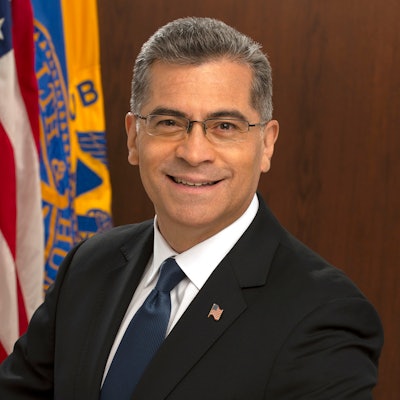Lawmakers, mental health experts, and advocates gathered recently to celebrate the milestone anniversary of the 988 Suicide and Crisis Lifeline. Hosted at the National Press Club in Washington, D.C., the stakeholders discussed the work their organizations have done since the launch of 988 and what still needs to be done to ensure that every American can access the help they need.
988, formally a 10-digit number, provides free and confidential support with trained crisis counselors available 24 hours a day. Over the course of a year, 988 has received more than 4 million contacts and the Department of Health and Human Services has recently announced more than $200 million in new funding to build local capacity for 988 and related crisis services.
Xavier Becerra, secretary for the Department of Health and Human Services, said President Biden, has invested in 988 to ensure that people had early access to the new three-digit number. Xavier Becerra
Xavier Becerra
“That makes it possible for Americans who are hurting, who are about to go the wrong way and that fork in the road to say, I'm going to call 988,” said Becerra at the event that was convened by the media organization, The Hill. “Like 911 for emergencies, 988 for mental health crisis is now there for you.”
In March of 2022, through the American Rescue Plan, the Biden Administration provided $180 million to support local capacity to answer crisis calls and establish more community-based mobile crisis response and crisis stabilizing facilities to minimize unnecessary emergency department visits.
The Administration continued to build on that support in the President’s FY23 budget investing an additional nearly $700 million for staff and local crisis centers.
“We did extensive community engagement and outreach to hear exactly from the community what they wanted from us,” said Adrienne Breidenstine, vice president of policy and communications at Behavioral Health System Baltimore.
Across many experts who spoke at the event last Thursday, a common issue emerged. Only a small fraction of adults in the US are familiar with 988 a year after the initial launch. According to the National Alliance on Mental Illness, more awareness is needed about 988 and the work to provide a mental health response for every mental health crisis. In the US, 14.1 million US adults have experienced serious mental illness in 2021, according to the National Alliance on Mental Illness (NAMI).
“Our systems have failed so many people,” said Tina Orwall, a politician from the state of Washington. “We often traumatize people in crisis. People are sent to jail. They're sent to emergency departments and strapped in gurneys. And I know it's going to take time and trust… how do we create a system that's trauma informed, that's healing, that's culturally sensitive? And that's going to take all of us coming together to figure that out.”
Youth mental health has been particularly challenging according to Hannah Wesolowski, chief advocacy officer for NAMI. Though young adults on college campuses were more aware of the existence of 988, compared to other age groups, it was still much lower than what experts on the panel would want to see, said Wesolowski.
NAMI has established campus programs to share mental health resources to students and help share messaging on campus. Within the program, NAMI promotes peer-to-peer communication to spread awareness of 988.
988 has established a mobile response team to reach differently abled individuals and young adults who prefer to not talk on the phone. On the website, users can live chat with a mental health respondent as well as text for help. Yet there has not been appropriate action taken for an awareness campaign, said Breidenstine.
She said that any amount of money towards a campaign would be valuable.
“We can’t be surprised that awareness is low,” said Breidenstine. “You look at smoking cessation campaigns, we’re looking at $50 to a $100 million dollars to save lives. I mean [a 988 campaign] could have such an impact.”





















